The art of finding the perfect candidate is no less than a waltz between ambition and intuition. This waltz can only become a lasting legacy when processed with the required skills, finesse, a certain level of creativity, and most importantly, staying at the top of trending interview statistics.
Getting insights into the dynamically changing expectation of candidates and the job market ensures that employers remain competitive in attracting and securing top talent. If you are that employer who knows the importance of staying aligned with the emerging trends when hiring talent for your organization, this article is for you.
We have researched, probed, and explored 81 stats and trends to follow for job interviews in 2023. Our article will help you stay current with developing patterns, technological advancements, and new methodologies for optimizing the interview process.
By the time you finish reading, you will have a full grasp of the process to make informed decisions for the upcoming interviews that will prove to be profitable for the whole organization.
81 Most Interesting Job Interview Statistics & Trends For Better Hiring Decisions
Here are our top 3 picks for the best job interview statistics:
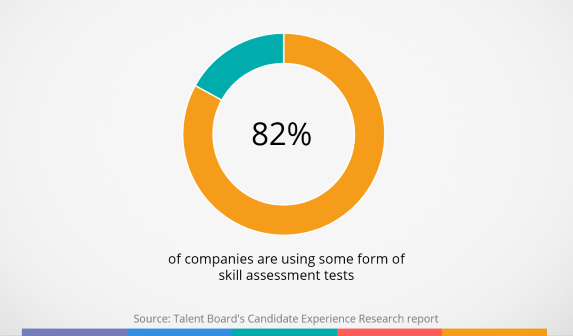
- According to LinkedIn’s report, 76% of professionals believe that skills assessments are an effective way of evaluation and 82% of companies have implemented skill assessment tests. Skills-based assessments provide a more objective measure of a candidate’s capabilities and can help identify top performers.
- How many interviews a candidate should expect? According to a survey, on average, candidates go through 2-4 interviews before getting a job offer. This can include a combination of phone interviews, initial interviews, panel interviews, and final interviews.
- The percentage of applicants who reach the interview round can be relatively low, often ranging from 2% to 3%.
Let’s take a detailed look at the 81 job interview statistics and trends to improve your hiring strategy.
I. 10 Key Statistics About Job Interview Preparation
Here are some stats on how candidates prepare for the job interview.
1. Importance of Preparation
90% of hiring managers believe that job interview preparation is a key factor in a candidate’s success.
2. Time Spent On Preparation
On average, candidates should spend 5-10 hours preparing for a job interview.
3. Researching The Company
71% of candidates research the company extensively before an interview.
4. Practicing Interview Questions
44% of candidates practice answering common interview questions before their interviews.
5. Use Of Mock Interviews
To land their dream job, 32% of job seekers participate in mock interviews to improve their interview performance.
6. Preparing Responses
46% of candidates prepare specific examples and anecdotes to use during their interviews.
7. Confidence Boosting Techniques
43% of candidates use techniques like positive self-talk and visualization to boost their confidence before interviews.
8. Dressing For Success
According to a survey, 65% of hiring managers consider a candidate’s dress and appearance during the interview.
9. Rehearsing Non-Verbal Communication
44% of candidates practice their non-verbal communication skills, like maintaining eye contact and good posture.
10. Seeking Professional Help
23% of candidates seek professional interview coaching or mentoring services to improve their interview skills.
II. 13 Major Statistics About The Job Interview Process
Let’s discuss some stats on the job interview process.
11. Increasing Interview Stages
45% of companies have added additional interview stages to their recruitment process compared to previous years.
12. Lengthy Interview Process
According to a study, the average interview process length is 27.5 days.
13. Panel Interviews On The Rise
Panel interviews are conducted by 34% of organizations to evaluate candidates more comprehensively.
14. Pre-Employment Assessments
76% of employers use pre-employment assessments, like skills tests or personality assessments, as part of their interview process.
15. Remote Job Interviews
According to a survey, 44% of companies now conduct remote job interviews.
16. Importance Of Soft Skills
92% of employers value candidates’ soft skills as equal to their technical skills.
17. Increasing Focus On Cultural Fit
One study found that 90% of employers emphasize assessing candidates’ cultural fit within the company’s values and work environment during interviews.
18. Use Of Assessment Centers
To evaluate candidates’ skills and abilities, 25% of large organizations employ assessment centers that simulate real work scenarios.
19. Gender Bias In Interviews
On average, women are 30% less likely to receive job interview calls compared to men with the same qualifications and characteristics.
20. Gender Disparities In Salary Negotiation
Women are 30% less likely to negotiate their salary during the job interview process compared to men.
21. Interview Duration
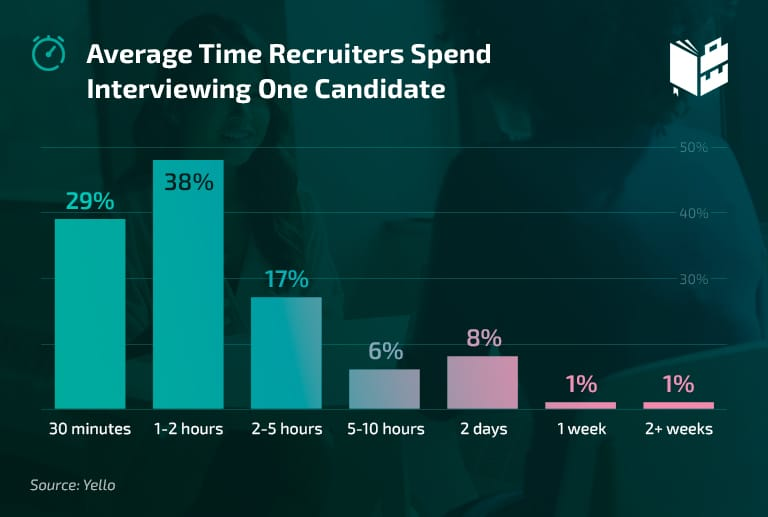
The average interview duration across industries is 45 minutes with some interviews lasting as short as 20 minutes or as long as 90 minutes.
22. Importance Of Video Resume Submissions
An overwhelming 79% of hiring managers acknowledge the increased importance of video in their interactions with the candidates and their evaluation.
23. Post-Interview Feedback
Approximately 70% of candidates don’t receive any feedback after their job interviews, indicating a need for improvement in providing timely feedback to applicants.
III. 5 Staggering Statistics About Interview Questions
Now let’s talk about some key statistics and trends in interview questions.
24. Behavioral Questions Effectiveness
75% of hiring managers believe that behavioral questions are effective in assessing a candidate’s potential performance.
25. Competency-Based Questions
Almost 63% of organizations incorporate competency-based questions to evaluate candidates’ skills and abilities.
26. Salary Expectation Discussions
According to a study, 67% of interviews involve discussions on salary expectations to align candidate expectations with the company’s compensation structure.
27. Hypothetical Scenarios
63% of employers present hypothetical scenarios during interviews to assess candidates’ problem-solving abilities and decision-making skills.
28. Role-Play Exercises
Approximately 38% of organizations incorporate role-play exercises in interviews to evaluate candidates’ ability to handle real-life work situations.
IV. 14 Important Statistics About The Use Of Technology To Interview Candidates
Here are some major stats on how technology is influencing the interviews.
29. Popularity Of Video Interviews
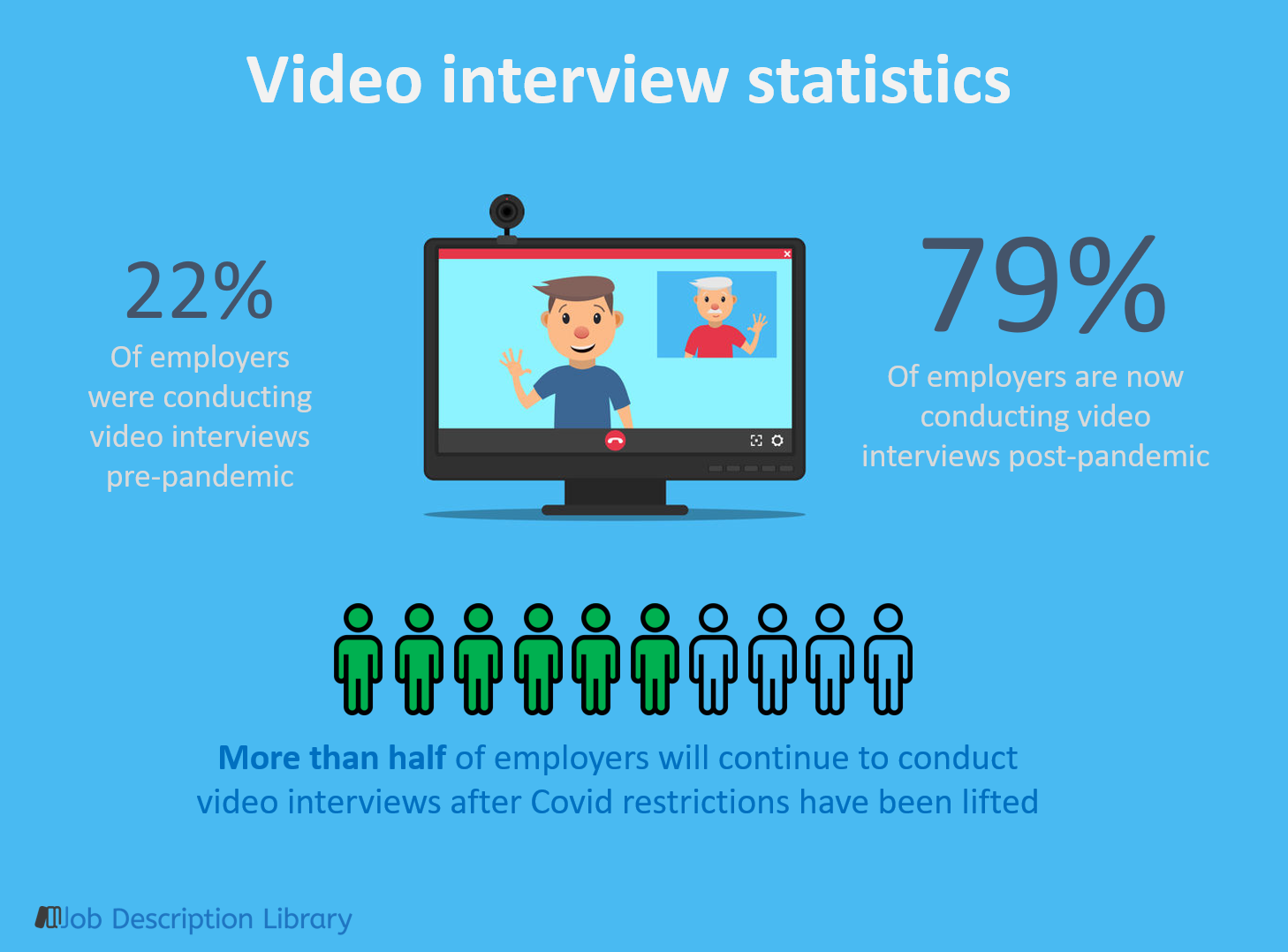
According to a study, 79% of hiring managers use video technology to interview and evaluate candidates, a significant increase from previous years.
30. Remote Assessments
52% of companies use remote assessment tools to evaluate candidates’ skills and qualifications during the interview process.
31. AI-Powered Assessments
Around 40% of organizations leverage AI-powered assessment tools to screen candidates for specific job-related skills.
32. Automated Interview Scheduling
A study found that 51% of companies use automated interview scheduling tools to streamline the process and improve efficiency.
33. Live Coding Interviews
58% of tech companies conduct live coding interviews to assess candidates’ coding skills and problem-solving capabilities in real-time.
34. ATS Usage
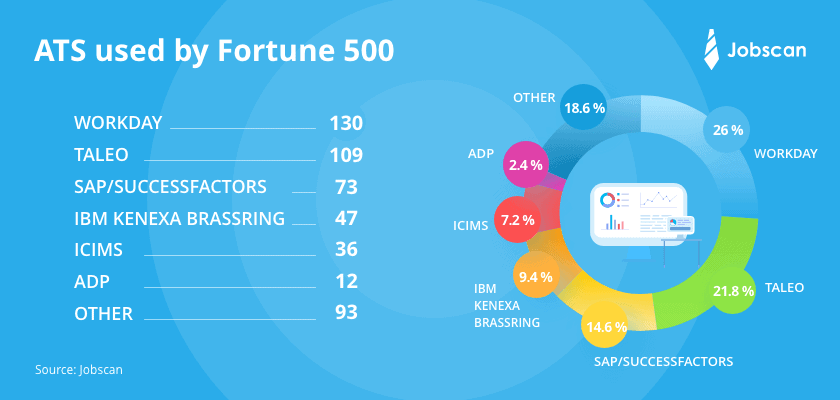
Approximately 98% of Fortune 500 companies and large enterprises use an ATS for their recruitment and hiring processes.
35. Resume Screening Efficiency
On average, an ATS can screen and process around 75% of resumes, reducing the time and effort required for manual screening by recruiters.
36. Increase In the Use Of Mobile Apps
86% of job seekers use mobile devices to search for jobs, leading to an increased demand for mobile-friendly processes.
37. AI-Powered Chatbots
Almost 41% of organizations use AI-powered chatbots to engage with candidates, answer frequently asked questions, and provide initial screening in the early stages of the hiring process.
38. Remote Proctoring
Approximately 35% of organizations implement remote proctoring tools to maintain the integrity of online assessments and prevent cheating.
39. Video Interview Duration
The average length of a video interview is 30 minutes with some interviews going up to 2 hours.
40. Text Messages As A Scheduling Tool For Job Interviews
According to a survey, 41% of employers in the US intend to incorporate text messages as a means to schedule job interviews.
41. Virtual Job Fairs
83% of potential candidates prefer virtual job fairs to connect with recruiters.
42. Use Of Background Screening Technology
67% of employers use technology-enabled background screening solutions to verify candidates’ credentials and ensure a safe hiring process.
V. 19 Exciting Candidate Experience Statistics
It’s time to look at statistics on how candidates perceive their experience during the interview.
43. Positive Candidate Experience Impact
When asked, 87% of candidates mentioned that a positive interview experience has the power to change their perception of a company that they had doubts about. On the other hand, 83% of candidates said that a negative interview experience can actually change their previously positive opinion about a role or company.
44. Quick Application Process
According to this report, 70% of candidates abandon an application if it takes more than 15 minutes to complete.
45. Importance of Prompt Feedback
79% of candidates expect to receive feedback within a week after an interview.
46. Transparent Job Descriptions
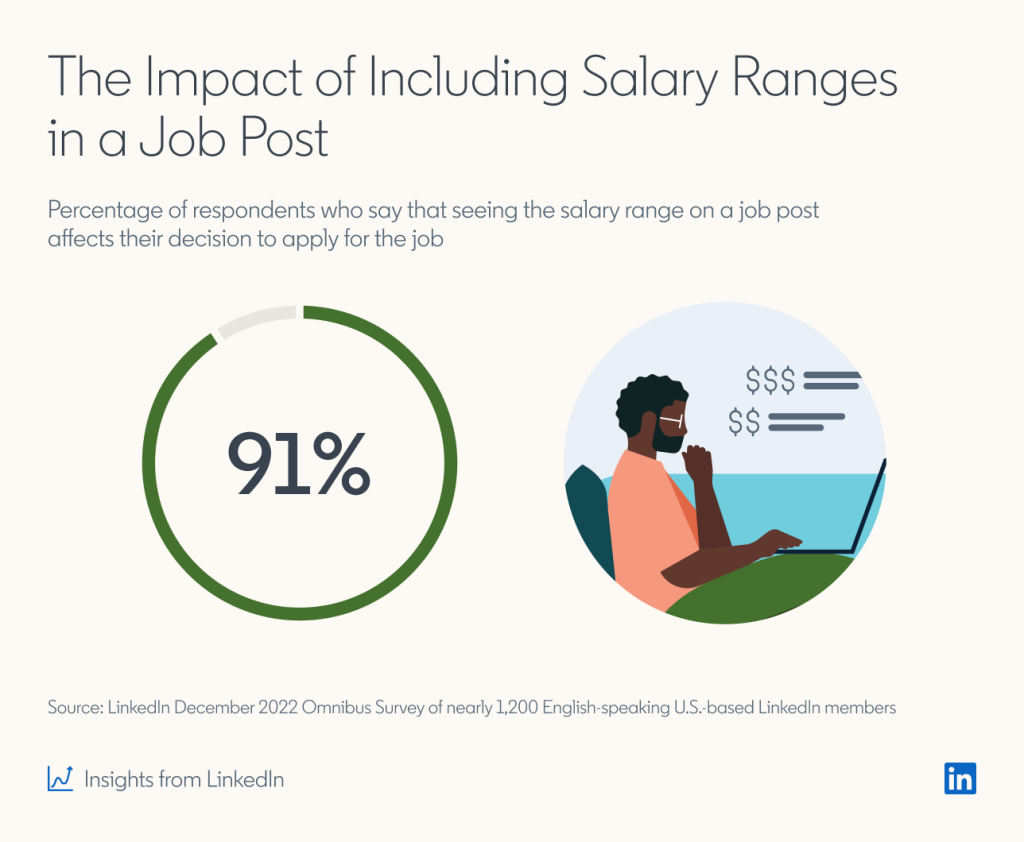
In the US, 91% of candidates consider job descriptions with salary ranges more attractive than those without.
47. Salary Range In Job Descriptions Influence Candidate Perception
More than 82% of respondents revealed that a salary range in a job description would positively shape their opinion about a company.
48. Employer Brand Perception
Approximately 75% of candidates research a company’s employer brand before applying for a job.
49. Seamless Interview Scheduling
91% of candidates appreciate the ability to self-schedule interviews using online tools.
50. Influence Of Feedback
Candidates are 4 times more inclined to consider a company for future opportunities when the company provides them with feedback.
51. Positive Candidate Referral
78% of candidates are more likely to refer others to a company if they had a positive candidate experience.
52. Social Media Presence
75% of candidates consider a company’s social media presence when deciding whether to apply for a job.
53. Importance Of Responsive Communication
85% of candidates expect timely and responsive communication from employers during the hiring process.
54. Mobile Device Impact On Job Application Rates
Job seekers using mobile devices complete 53% fewer job applications compared to other devices, highlighting the notable impact of mobile usage on application rates.
55. Candidate Feedback Influence
68% of candidates are likely to share their positive interview experiences on employer review websites and social media platforms.
56. Spreading The Word
A remarkable 81% of candidates are inclined to share their positive candidate experience with their family, friends, and peers.
57. Impact Of Employee Testimonials
According to a survey, 65% of candidates value employee testimonials and reviews as influential factors when considering a company.
58. Inclusive Hiring Practices
86% of candidates believe that a diverse and inclusive workforce is an essential factor in choosing an employer.
59. Interview Preference Divide
When it comes to job interviews, a large majority of 70% of people prefer to have interviews in person while only a small percentage of 17% prefer video calls.
60. Employer Reputation
According to a study, 80% of candidates are more likely to apply for a job at a company if they know the brand even if they are currently employed elsewhere.
61. Seamless Onboarding Experience
69% of candidates who have a positive onboarding experience are likely to remain with the company for at least 3 years.
62. Rising Demand For Virtual Assistants
There has been a substantial increase of 41% in hiring virtual assistants through offshore agencies.
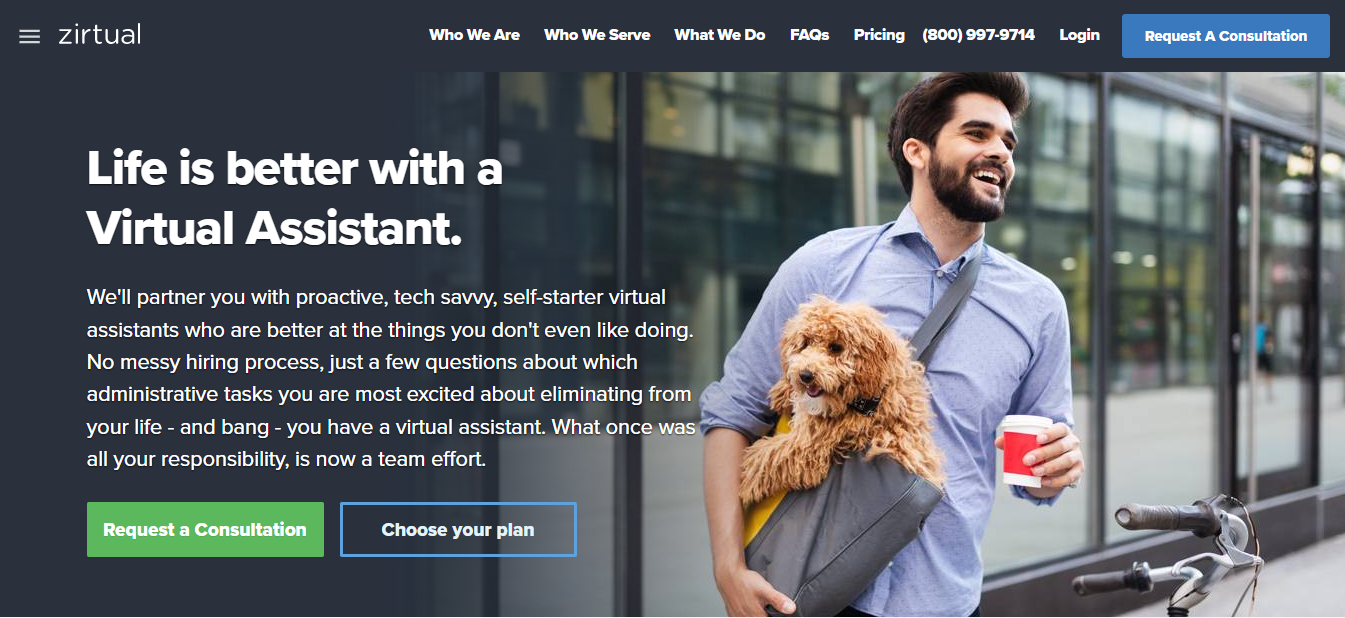 With this increase in the adoption of virtual assistants, it’s clear that the demand for streamlined productivity and efficient support is on the rise. Zirtual steps in as your trusted partner, providing a dedicated team of highly skilled professionals who work seamlessly with you to tackle your administrative, personal, and professional needs.
With this increase in the adoption of virtual assistants, it’s clear that the demand for streamlined productivity and efficient support is on the rise. Zirtual steps in as your trusted partner, providing a dedicated team of highly skilled professionals who work seamlessly with you to tackle your administrative, personal, and professional needs.
At Zirtul, we provide a virtual assistant who not only understands your unique requirements but also becomes an extension of your team. Our hand-picked assistants are US-based and college graduates. We meticulously train them to adapt to your workflow and preferences for a seamless integration that saves you time, energy, and resources.
Zirtual is more than just an offshore agency – we prioritize building strong, long-term relationships with our clients, fostering open communication channels, and providing personalized support.
VI. 19 Interesting Stats About Diversity & Inclusion in Job Interviews
Here are some key statistics on how diversity and inclusion are shaping the interview and hiring process.
63. Diversity Hiring Goals
78% of companies have set specific diversity hiring goals for their recruitment processes.
64. Unconscious Bias Training
Nearly 28% of organizations provide unconscious bias training to interviewers to promote fair and inclusive hiring practices.
65. Diverse Interview Panels
65% of employers involve diverse interview panels to ensure a fair and unbiased evaluation of candidates.
66. Diversity As A Crucial Element Of The Ideal Workplace
An overwhelming majority of 82% of candidates expressed that they view diversity as an essential component of their ideal workplace.
67. Accommodations For Disabilities
81% of employers make accommodations for candidates with disabilities during the interview process.
68. Gender-Inclusive Language
Major organizations like United Airlines, EasyJet, and Japan Airlines have shifted to using gender-inclusive language in job descriptions and interview materials.
69. Ethnic & Racial Diversity
Approximately 62% of employers actively promote ethnic and racial diversity during the interview and hiring process.
70. LGBTQ+ Inclusion
93% of Fortune 500 companies have specific policies and practices in place to ensure LGBTQ+ inclusivity in job interviews.
71. Accessibility Considerations
88% of companies ensure that interview venues and platforms are accessible for candidates with diverse needs and backgrounds.
72. Cultural Sensitivity Training
According to a study, 70% of organizations provide cultural sensitivity training to interviewers to foster inclusive interactions with candidates from diverse backgrounds.
73. Intersectionality Awareness
Nearly 64% of employers actively consider intersectionality, recognizing the overlapping identities and experiences of candidates, during job interviews.
74. Neurodiversity Hiring Initiatives
At least 50 large corporations in the US have implemented neurodiversity hiring initiatives to create opportunities for candidates with autism or other neurological differences.
75. Language Inclusivity
34% of organizations accommodate candidates by offering multilingual interview options and translation services.
76. Age-Inclusive Hiring Practices
Only 8% of companies promote age inclusivity by avoiding age-related bias and considering the experience and potential of candidates of all ages.
77. Inclusive Interview Evaluation Criteria
Almost 56% of employers use inclusive evaluation criteria that focus on skills, qualifications, and potential rather than traditional markers of success.
78. Socioeconomic Diversity Consideration
24% of organizations take into account candidates’ socioeconomic backgrounds during the interview process to promote economic diversity and equal opportunities.
79. Racial Disparity In Interview Callbacks
White-sounding names have a 50% higher likelihood of receiving an interview callback compared to black-sounding names candidates.
80. Inclusive Onboarding Support
83% of organizations provide inclusive onboarding support, including diversity and inclusion training, to ensure a welcoming and inclusive transition for new hires from diverse backgrounds.
81. Inclusive Candidate Feedback
71% of companies provide inclusive and constructive feedback to candidates, fostering growth and development regardless of the final hiring decision.
Conclusion
Reality check: interviews can be the most nerve-wracking part of the whole hiring process for employers as well. One solid way to get through this test-of-brains period is to stay up to date with the latest interview statistics.
Staying current with the interview statistics is not just a strategic advantage but it is a commitment to continuous improvement, candidate-centricity, and ultimately the success of the hiring process. So if you are looking to build an exceptional team responsible for the growth and success of your organization, you cannot omit this part.
We at Zirtual offer exceptional virtual assistants that can revolutionize your hiring process. Our VAs knows how valuable time and opportunity are for business owners, and that is why they work relentlessly to ensure that you don’t miss out on anything.
Imagine having dedicated assistants who handle all the administrative tasks, scheduling interviews, and sourcing candidates from various job boards and platforms. What else could you ask for? Intrigues to learn more? Book a consultation with us now.
